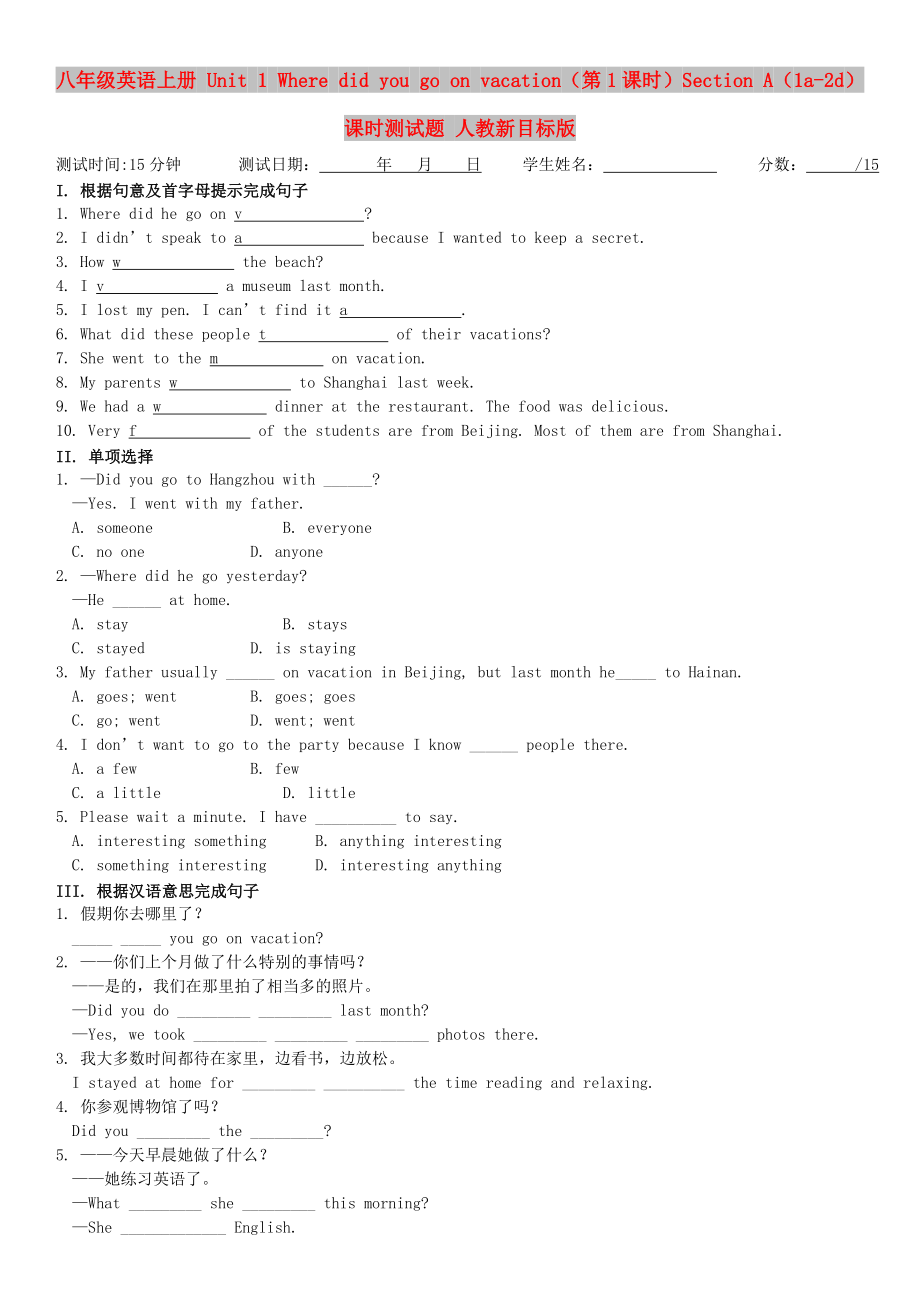《八年級(jí)英語上冊(cè) Unit 1 Where did you go on vacation(第1課時(shí))Section A(1a-2d)課時(shí)測(cè)試題 人教新目標(biāo)版》由會(huì)員分享�����,可在線閱讀,更多相關(guān)《八年級(jí)英語上冊(cè) Unit 1 Where did you go on vacation(第1課時(shí))Section A(1a-2d)課時(shí)測(cè)試題 人教新目標(biāo)版(2頁珍藏版)》請(qǐng)?jiān)谘b配圖網(wǎng)上搜索��。
1���、八年級(jí)英語上冊(cè) Unit 1 Where did you go on vacation(第1課時(shí))Section A(1a-2d)課時(shí)測(cè)試題 人教新目標(biāo)版
測(cè)試時(shí)間:15分鐘 測(cè)試日期: 年 月 日 學(xué)生姓名: 分?jǐn)?shù): /15
I. 根據(jù)句意及首字母提示完成句子
1. Where did he go on v ?
2. I didn’t speak to a because I wanted to keep a secret.
3.
2�、How w the beach?
4. I v a museum last month.
5. I lost my pen. I can’t find it a .
6. What did these people t of their vacations?
7. She went to the m on vacation.
8. My parents w to Shanghai last week.
9. W
3�����、e had a w dinner at the restaurant. The food was delicious.
10. Very f of the students are from Beijing. Most of them are from Shanghai.
II. 單項(xiàng)選擇
1. —Did you go to Hangzhou with ______?
—Yes. I went with my father.
A. someone B. everyone
C. no one
4�、 D. anyone
2. —Where did he go yesterday?
—He ______ at home.
A. stay B. stays
C. stayed D. is staying
3. My father usually ______ on vacation in Beijing, but last month he_____ to Hainan.
A. goes; went B. goes; goes
C. go; went D. went; went
4. I don
5、’t want to go to the party because I know ______ people there.
A. a few B. few
C. a little D. little
5. Please wait a minute. I have __________ to say.
A. interesting something B. anything interesting
C. something interesting D. interesting anything
III. 根據(jù)漢語意思完成句子
1. 假期你
6��、去哪里了�����?
_____ _____ you go on vacation?
2. ——你們上個(gè)月做了什么特別的事情嗎�?
——是的��,我們?cè)谀抢锱牧讼喈?dāng)多的照片��。
—Did you do _________ _________ last month?
—Yes, we took _________ _________ _________ photos there.
3. 我大多數(shù)時(shí)間都待在家里,邊看書����,邊放松。
I stayed at home for _________ __________ the time reading and relaxing.
4. 你參觀博物館了
7�、嗎?
Did you _________ the _________?
5. ——今天早晨她做了什么���?
——她練習(xí)英語了���。
—What _________ she _________ this morning?
—She _____________ English.
參考答案
I. 根據(jù)句意及首字母提示完成句子
1. vacation 2. anyone 3. were 4. visited 5. anywhere
6. think 7. mountains 8. went 9. wonderful 10. few
II. 單項(xiàng)選擇
1.
8、 D 考查不定代詞的用法���。someone��、everyone多用于肯定句�����,no one用于否定句�,anyone
常用于否定句和疑問句����。
2. C 考查一般過去時(shí)的用法����。根據(jù)yesterday可知是問他昨天做的事情��,因此謂語動(dòng)詞應(yīng)用
過去式stayed��。
3. A 由usually可知第一個(gè)分句是一般現(xiàn)在時(shí)��,my father是第三人稱單數(shù)�����,故用go的第三
人稱單數(shù)形式goes��;第二個(gè)分句中由last month可推出用go的過去式went����。
4. B 句意:我不想去聚會(huì)是因?yàn)榫蹠?huì)上我沒有什么認(rèn)識(shí)的人。people本身是可數(shù)名詞復(fù)數(shù)���,
故選B。
5. C something用于肯定句中��,且形容詞修飾復(fù)合不定代詞時(shí)�����,一般位于復(fù)合不定代詞之
后。
III. 根據(jù)漢語意思完成句子
1. Where did 2. anything special; quite a few 3. most of 4. visit; museum 5. did; do; practiced
 八年級(jí)英語上冊(cè) Unit 1 Where did you go on vacation(第1課時(shí))Section A(1a-2d)課時(shí)測(cè)試題 人教新目標(biāo)版
八年級(jí)英語上冊(cè) Unit 1 Where did you go on vacation(第1課時(shí))Section A(1a-2d)課時(shí)測(cè)試題 人教新目標(biāo)版

